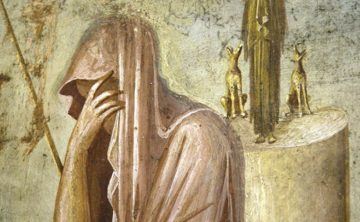Jay Tolson in The Hedgehog Review:
 Who is secular man, and why is he so unhappy?
Who is secular man, and why is he so unhappy?
Those are the questions animating The Unnamable Present, a short but wide-ranging book on the puzzles of late modernity and the ninth volume of Roberto Calasso’s extended commentaries on, among many other related topics, the mythical-religious wellsprings of human civilizations. Chairman of Italy’s distinguished literary house Adelphi Edizione, Calasso is too good a historian to say that Homo saecularis emerged only in recent centuries. The lineaments of the type have existed since Paleolithic times, present as what Calasso calls a “perpetual shadow.” The shadow has been cast by the figure dominating most of the human record, Homo religiosus, defined by the sociologist Mircea Eliade as one who “always believes there is an absolute reality, the sacred, which transcends this world but manifests itself in the world, thereby sanctifying it and making it real.”
What has changed dramatically in recent centuries, Calasso writes, is that “the shadow has been transformed into normal man, who finds himself a solitary, hapless protagonist at the center of the stage.” Unlike the many varieties of Homo religiosus—Calasso mentions Vedic man, born owing four debts, above all those to the Hindu gods—Homo saecularis “owes nothing to anyone,” stands alone, free to do what he wishes “so long as it is lawful.”
More here.
